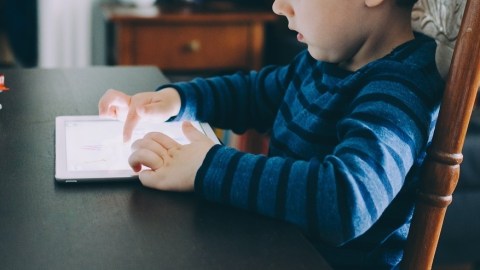How does screen time affect kids’ brains? The first results of a landmark study are alarming.

Pixabay
- The study uses MRI scans to track the changes in the brains of children who use screens at varying amounts.
- Early results revealed that kids who use screens for more than 7 hours per day show physical changes to the brain in the form of premature thinning of the cortex.
- It will likely be decades before scientists truly understand how smartphones and other technologies affect the brain.
How does screen time affect the developing brains of young kids?
That’s the big question behind a $300-million study conducted by the National Institutes of Health that’s using MRI scans to examine changes in brain structure among children who use smartphones and other screen devices. The first batch of results from the study, which was highlighted by CBS’s 60 Minutes on Sunday, shows that kids who spent more than two hours per day on screens scored lower on language and thinking tests.
Alarmingly, kids who spent more than seven hours per day on electronic devices showed premature thinning of the cortex, which Dr. Gaya Dowling of the National Institutes of Health described as a “maturational process” that typically happens later in development.
“We don’t know if it’s being caused by the screen time,” said Dowling. “We don’t know yet if it’s a bad thing. It won’t be until we follow them over time that we will see if there are outcomes that are associated with the differences that we’re seeing in this single snapshot.”
It will take a few years to get answers to some of the questions raised by the study. However, the most interesting results will likely come decades from now, when researchers can see the long-term effects of technology use on the brain. Dr. Dimitri Christakis of Seattle Children’s Hospital, the lead author of the American Academy of Pediatrics’ most recent guidelines for screen time, told CBS he’s concerned about this uncertainty.
“In many ways, the concern that investigators like I have is that we’re sort of in the midst of a natural kind of uncontrolled experiment on the next generation of children,” Christakis said.
Most kids say they spend too much time on smartphones
American teenagers now spend more than four and a half hours on their phones per day, and that’s not even necessarily counting additional time spent playing video games, watching TV or using the computer. It’s no surprise that a generation of kids who’d be hard pressed to remember a time without smartphones have made them a big part of daily life—the iPhone came out in 2007, after all, so kids born after 1995 entered adolescence with touchscreens in hand.
Many kids are themselves concerned. A recent survey from the Pew Research Center found that 54 percent of U.S. teens said they spend too much time on their phones, and 60 percent of them consider spending too much time online to be a “major problem.” The data seem to back that up, with today’s teenagers reporting lower levels of drinking, sex and drug use, yet higher levels of depression and loneliness.
This year, Facebook, Apple and Instagram began offering tools to help users monitor and reduce their screen time, including features that let users set time limits and see how their screen time is allocated across different apps. Some of these features are designed to help parents restrict their children’s screen time.
Of course, the best solution might be to wait to give your kid a phone until it’s necessary. The American Academy of Pediatrics’ recommends for “children younger than 18 months, avoid use of screen media other than video-chatting,” and that parents “of children 18 to 24 months of age who want to introduce digital media should choose high-quality programming, and watch it with their children to help them understand what they’re seeing.”
An unprecedented technology
Tristan Harris, a former Google manager who’s spoken publicly on how Silicon Valley is intentionally making smart devices as addictive as possible, told 60 Minutes that some parents are under the false impression that smartphone use is analogous to chatting on the phone in past decades.
“… there’s a narrative that, oh, I guess they’re just doing this like we used to gossip on the phone, but what this misses is that your telephone in the 1970s didn’t have a thousand engineers on the other side of the telephone who were redesigning it to work with other telephones and then updating the way your telephone worked every day to be more and more persuasive.”





